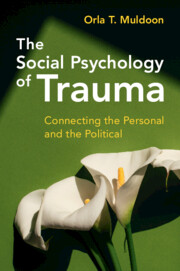At its core, this book presents a single idea: trauma is a social phenomenon. Our risk of trauma, our responses to trauma and how life unfolds for any of us after a traumatic experience are determined by our social world. Despite this, when we think about trauma, the dominant way of thinking at least in the Western world is that traumatised people are a clinical concern and that modern medicine, psychiatry or clinical psychology might be able to provide a ‘treatment’ for affected people.
This way of looking at trauma minimises the influence of the social and the political. And when people do think about the social and political, typically the impact of traumatic events is thought about at the population level. This perspective de-emphasises the impact of experience for individual people within a population. Entire populations will be constructed as ‘traumatised’ despite clear evidence that within that population there is huge variability in the direct and indirect experience of trauma.
This book is an attempt to integrate these two positions. Trauma is a clear example of when the personal is political. It is part of the reason that I chose the title ‘The Social Psychology of Trauma’ for the book. So, this book highlights the central and, indeed, pivotal role of individual experience of trauma. However, there is also an appreciation that people often experience traumatic events because of their group membership. As such, experiences of trauma, even where they are experienced privately, have wider ripple effects on the social groups to which victims belong.
There is a second reason I chose that name for the book. Some concepts in social psychology are ephemeral. They can be hard to explain and hard to grasp. Take, for example, the concept of social identity: the idea that a person’s sense of who they are is derived from inclusion in a social category or group. This sounds like a very abstract idea until it is translated or applied to a real-world example. A straightforward illustration of a social identity is available through reference to occupational group membership and national group membership. So, I have a sense of being a ‘psychologist’ and ‘Irish’; indeed, they are two social identities I value, because I am included in these social categories by both myself and others. This use of myself as the example, as it were, is the second reason the book alludes to both the personal and the political.
In each of the chapters that follow I illustrate the ideas by reference to my own efforts when faced with some difficulty or stressful experience in life. And whilst some of these experiences were deeply distressing at the time, my life has not been characterised by trauma. And it is not that I have led a particularly interesting or challenging life. Rather, I am using my own experience of trauma to represent or illustrate my point. My hope is that by illustrating the ideas using my own story, readers will gain a sense of the value of the approach. I am particularly hopeful this will allow readers to apply the approach in the same way to understand their own experiences. In taking this approach, I hope it becomes clear that the causes of and solutions to traumatic experiences are rarely found at the individual level. All too often it is communities and society that need to be fixed rather than those who are traumatised.
It is unusual for an academic psychologist to write a book littered with references to their own life. Indeed, research psychologists pride themselves on their academic impartiality and scientific objectivity. This makes me vulnerable on a couple of dimensions: vulnerable to scepticism of my academic peers, but also vulnerable because of the personal information that I disclose, not least my own struggles with depression and bereavement. I am hopeful nonetheless that the approach makes the book a little more accessible, and that any odd or surprising admissions will be met with the kindness of those who read the earlier version of these chapters.
Psychology is a discipline heavily grounded in the scientific approach. Empiricism, data and evidence are highly valued. Psychology distinguishes itself from other disciplines such as philosophy and political theory by this reliance on data. Though psychologists traditionally relied on numeric data, in recent years non-numeric, or qualitative, data has been embraced. Qualitative data has been used to characterise the nature of populist rhetoric, to understand the lived experience of traumatised groups and to expose rare phenomena. At the start of each chapter in this book, I use poems as a form of qualitative data. Each poem quoted speaks to the issue that the chapter addresses. We know that the poet felt their experience merited writing about. It is also safe to say that the poet assumed or at least hoped their words would be read and their experience would resonate with readers. These authors and their readers understand how the experience of trauma is socially embedded. Excerpts from ‘North’ from Opened Ground: Selected Poems 1966–1996 by Seamus Heaney are reproduced with permission of Farrar, Straus and Girous (US) and Faber and Faber Ltd (UK). Similarly ‘Why Brownlee Left’ from Selected Poems 1968–2018 by Paul Muldoon is reproduced with permission of Farrar, Straus and Girous (US) and Faber and Faber Ltd (UK). These poems can be seen as evidence, at least in literature, that the social and political dimensions of trauma are uncontroversial. They offer lyrical evidence that social and political psychological foundations of trauma are major, as well as interest and inspiration.

